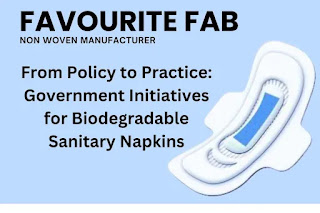From Policy to Practice: Government Initiatives for Biodegradable Sanitary Napkins
In recent years, the discourse surrounding menstrual hygiene management has gained significant momentum globally. In many parts of the world, access to safe and sustainable menstrual products remains a challenge, with detrimental implications for both the environment and public health. However, governments and policymakers are increasingly recognizing the urgency of addressing this issue through innovative initiatives. One such endeavor gaining traction is the promotion of biodegradable sanitary napkins.
The Need for Sustainable Menstrual Products
Traditional sanitary napkins, often made of non-biodegradable materials like plastics and synthetic fibers, pose a severe threat to the environment. These products contribute significantly to pollution, as they take hundreds of years to decompose fully. Improper disposal practices, including flushing them down toilets, further exacerbate the problem by clogging sewage systems and polluting water bodies.
Moreover, the use of non-biodegradable sanitary napkins can have adverse health effects due to their chemical composition. Many conventional pads contain chlorine, dioxins, and other harmful substances that can cause skin irritation, infections, and even long-term health complications.
Government Policy Intervention
Recognizing these challenges, governments worldwide are taking proactive measures to promote the use of biodegradable sanitary napkins. Policy interventions encompass a range of strategies aimed at incentivizing the production, distribution, and adoption of eco-friendly menstrual products.
1. Subsidies and Incentives
Several governments offer subsidies and financial incentives to manufacturers producing biodegradable sanitary napkins. These measures help reduce production costs, making eco-friendly products more affordable and accessible to consumers. Additionally, tax breaks and subsidies encourage research and development in sustainable menstrual hygiene solutions, fostering innovation in the sector.
2. Awareness Campaigns
Government-led awareness campaigns play a crucial role in educating the public about the environmental and health benefits of switching to biodegradable sanitary napkins. Through workshops, seminars, and social media campaigns, policymakers aim to destigmatize menstruation and promote eco-friendly menstrual hygiene practices. These initiatives empower individuals to make informed choices while highlighting the broader environmental impact of their consumption patterns.
3. Regulation and Certification
Regulatory frameworks ensure that biodegradable sanitary napkins meet specific quality and safety standards. Governments collaborate with regulatory bodies and certification agencies to establish guidelines for the production, labeling, and marketing of eco-friendly menstrual products. By enforcing compliance with these standards, policymakers safeguard consumer interests and promote transparency within the industry.
4. Integration into Healthcare Systems
Efforts to mainstream biodegradable sanitary napkins often involve integrating them into existing healthcare systems. Governments partner with healthcare providers, schools, and community organizations to distribute eco-friendly menstrual products in underserved areas. By incorporating menstrual hygiene education into school curricula and healthcare initiatives, policymakers address social taboos surrounding menstruation while improving access to sustainable menstrual products.
Challenges and Future Directions
Despite the progress made, several challenges persist in the widespread adoption of biodegradable sanitary napkins. Economic barriers, cultural norms, and limited infrastructure continue to impede access to eco-friendly menstrual products in many regions. Addressing these challenges requires a multifaceted approach involving collaboration between governments, civil society, and the private sector.
Looking ahead, there is a growing consensus on the need for holistic solutions that prioritize sustainability, affordability, and inclusivity. Governments must continue to invest in research, innovation, and infrastructure to support the transition towards eco-friendly menstrual hygiene practices. By leveraging policy interventions effectively, policymakers can turn rhetoric into action, ensuring that sustainable menstrual products are not just a policy goal but a tangible reality for all individuals worldwide.
Factory
Gata No. 34, Mauza Khadwai, Tehsil Kirawali, Runkata, Agra, Uttar Pradesh, India-282007 📩 office@favouritehub.com
contact no 91-8800775462




Comments
Post a Comment